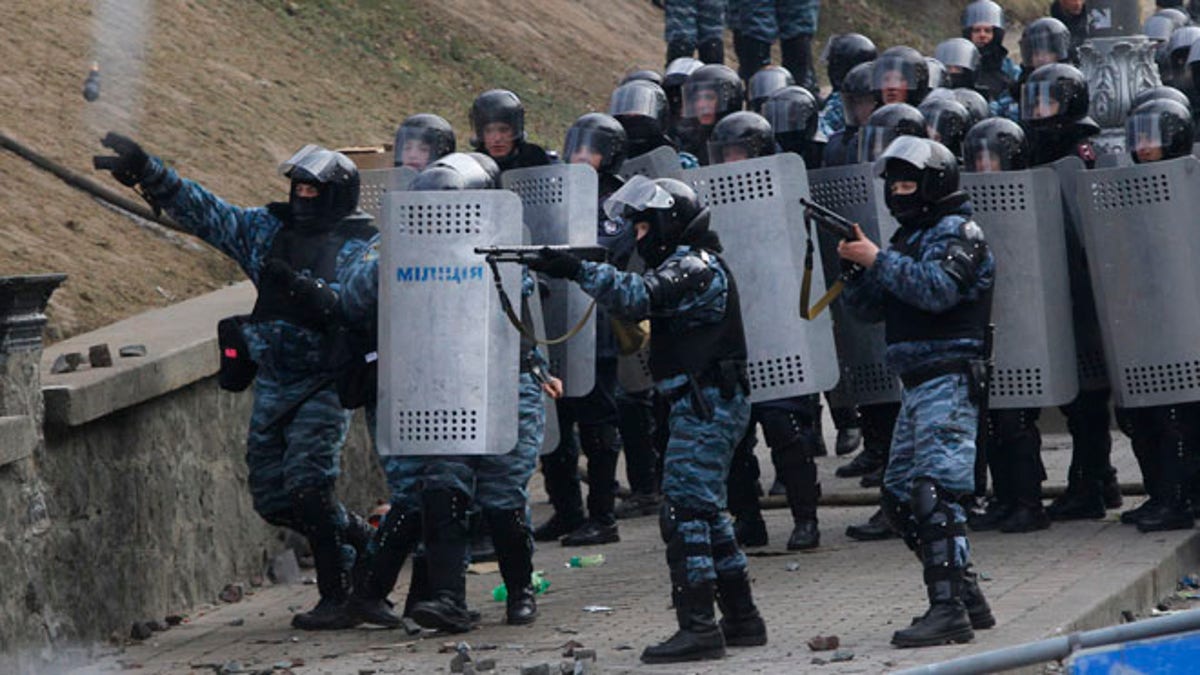
Jan. 20, 2014: Riot police officers shoot rubber bullets and throw a stun grenade at anti-government protesters, during unrest in central Kiev, Ukraine. (AP)
KIEV, Ukraine – Ukrainian President Viktor Yanukovych refused to meet Tuesday with an opposition leader who came to his office hoping for negotiations, dimming hopes for a resolution soon to the political crisis that has escalated into vicious street clashes between protesters and police.
Ukraine's two-month standoff shifted into a new phase after Yanukovych pushed through harsh anti-protest laws last week in an attempt to quash the demonstrations calling for his ouster. The mass protests in Kiev, the capital, erupted after Yanukovych spurned a pact with the European Union in favor of close ties with Russia, which offered him a $15 billion bailout.
Seeing the government ignore their demands and opposition leaders unable to present a coherent plan or even select a single leader, radical protesters have clashed with riot police in Kiev since Sunday, hurling stones and fire bombs at police and getting hit with tear gas and rubber bullets in return.
"A revolution is under way in Ukraine," said Petro Denkovets, 34, an entrepreneur. "What revolution takes place peacefully? Each side is showing its strengths. The government, its troops, and we, our fearlessness."
In a bid to ease the crisis, opposition leader Vitali Klitschko, who is a heavyweight boxing champion, went to Yanukovych's office for face-to-face talks on Tuesday, but was received only by his aides. The aides were part of a working group that Yanukovych told to hold negotiations with the opposition.
Yanukovych's office said the president was in a meeting at the time. But Klitschko held out hope that the leader would receive him later Tuesday.
"The center of the city of Kiev has been burning for two days," a disappointed Klitschko said. "The president sits two blocks away and does not hear it."
Despite heavy snowfall and freezing temperatures, several thousand protesters remained camped outside a government district in Kiev in front of rows of helmeted riot police who hid behind metal shields. Charred buses stood covered with ice, the ground was dotted with stones and the popular rock song "I will not give up without a fight" blared over the crowd.
The protesters had managed to hold their ground overnight, even as police moved in to dismantle some barricades. Fighting lulled on Tuesday morning, after Orthodox priests intervened and asked both sides for calm.
Still, nearly 1,500 activists sought medical help after the clashes, according to Oleh Musiy, who runs the protesters' medical team.
Opposition leader Arseniy Yatsenyuk, who had previously condemned violent protests, said the situation has changed.
"People have received the right to switch from peaceful to non-peaceful protest because the deafness of the authorities and their disregard for the people," he said Tuesday.
His ally, the jailed former Prime Minister Yulia Tymoshenko, also urged Ukrainians to go to the barricades.
"There is no other way for the people to deal with the mafia. Those standing on the front lines for Ukraine are heroes!" Tymoshenko said in a statement.
Heeding the call, young women worked Tuesday to clear the protest site of debris. Nearby, middle-aged men and women produced a drum beat of protest by hitting metal barrels and shields with sticks. In one dramatic scene, three black-robed Orthodox priests, holding crosses and icons, walked in between the police and the protesters, causing the fighting to stop.
During the clashes Monday night, Klitschko claimed that groups of young men had been hired by pro-government forces to smash shop windows and set cars ablaze in Kiev to create a pretext for the government to introduce martial law.
Protesters chased the men around, captured them and took them to be questioned. In a video broadcast by several Ukrainian media organizations, the activists showed a hammer and other tools used by the assailants. The protesters then marched the captives down the street and forced them to apologize.
Russian Foreign Minister Sergey Lavrov, meanwhile, accused the West of instigating the protests and some EU politicians of joining them.
"We would prefer that our European colleagues, at least some of them, don't behave in such an unceremonious way in connection with the Ukrainian crisis," he said. "It's simply unseemly and this is what is heating up the situation."
